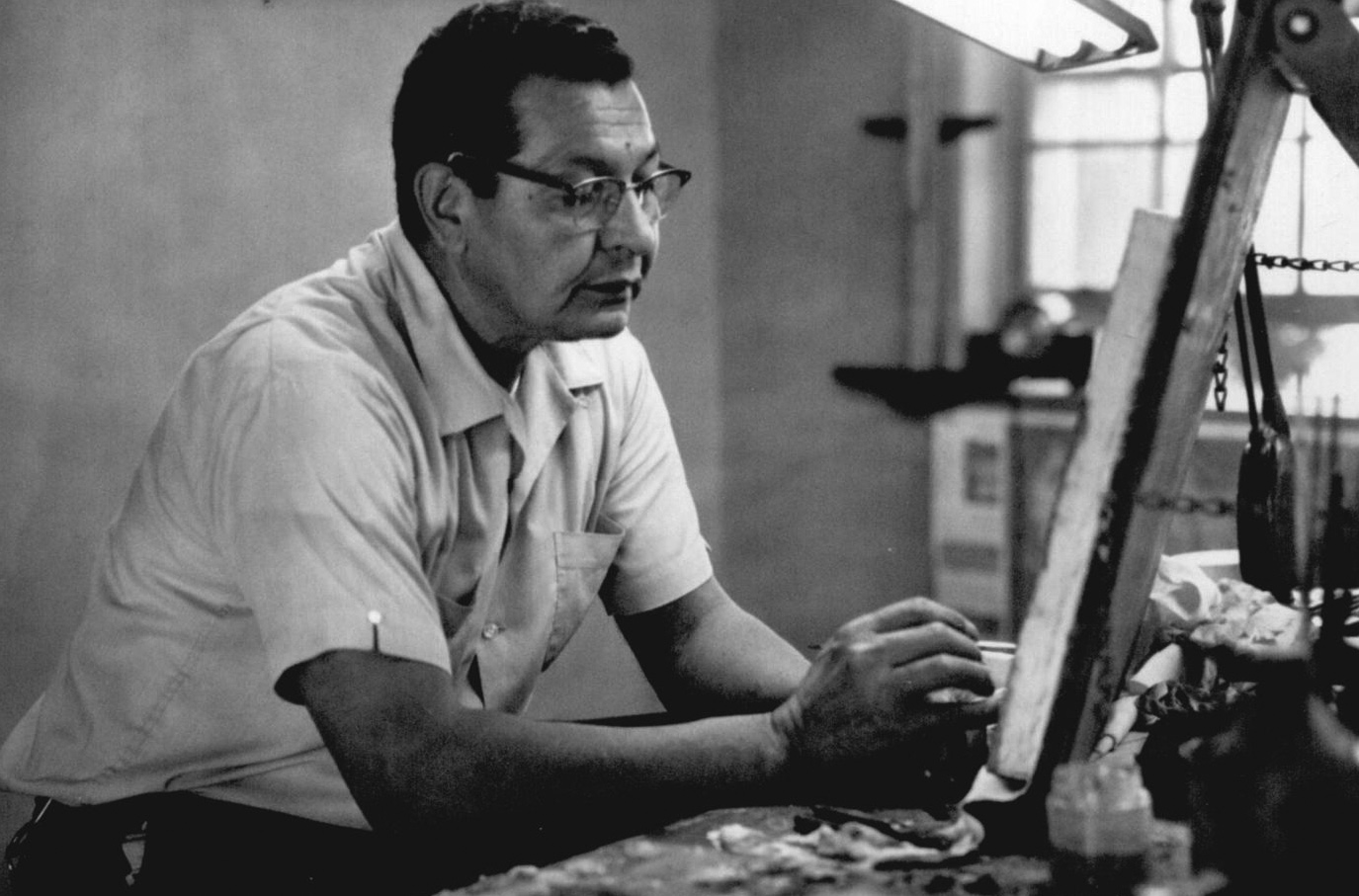The Encyclopedia of Oklahoma History and Culture
WEST, WALTER RICHARD, SR. (1912–1996).
Cheyenne Indian artist and educator (Cheyenne name Wah-pah-nah-yah) Walter Richard "Dick" West was born in a tipi near Darlington Agency, Oklahoma, on September 8, 1912, to Lightfoot West and Rena Flying Coyote. Dick West attended Concho Indian Boarding School and graduated from high school at Haskell Institute, at Lawrence, Kansas, in 1935. He attended Bacone College from 1936 to 1938 and then acquired bachelor's and master's degrees in fine arts in 1941 and 1950, respectively, from the University of Oklahoma. He subsequently studied mural techniques with Olaf Nordmark in Phoenix, Arizona, in 1941–42 and undertook graduate study at Northeastern State University, the University of Tulsa, and Redlands University in California.
He began teaching in 1941 at Phoenix Indian School. Serving in the U.S. Navy during World War II, he saw action in the European Theater from 1942 to 1946. After the war he taught at Phoenix Indian School in 1946–47. He chaired the art department in Bacone College from 1947 to 1970 and in Haskell Indian Junior College from 1970 to 1977. During the golden age of Indian art, 1946–80, West influenced a generation of students while exhibiting, winning awards, fulfilling commissions, and illustrating books. He was a popular lecturer, show judge, and well-known sign linguist, wearing his Cheyenne bonnet and buckskins. He believed education was key to survival of Indians and all people. He stressed research to his students, some of whom were Jimmy Anderson, Sharron Ahtone Harjo, Virginia Stroud, Joan Hill, Enoch Kelly Haney, Johnnie Tiger, Antowine Warrior, Don Secondine, Dennis Belindo, David Williams, Marlene Riding In Mameah, and Roland Whitehorse.
In 1941 West received a WPA–PWA mural commission for the U.S. Post Office in Okemah, Oklahoma. His teacher, Acee Blue Eagle, also competed for the job. West received two grand awards from Philbrook Indian Annual, in 1949 for Dance of the Soldier Societies and in 1955 for Peyote Vision. In 1954 he began Indian Christ, a series of eight oil paintings portraying the universality of Jesus.
Dick West was a dean of the traditional flat style of Indian painting and an innovator in contemporary abstract and semiabstract painting. He was also a sculptor. Characteristics of his work are sophisticated color, subtle brushwork, master draftsmanship, and detailed rendering of anatomy. His subject matter was the North American Indian, especially the Cheyenne tribe, on which he was an authority.
West's exhibit venues included the American Indian Exposition in Anadarko, Philbrook Indian Annuals and Oklahoma Annuals, the Denver Art Museum, the Joslyn Museum, the DeYoung Museum, the Museum of New Mexico, the Gallup Inter-Tribal Indian Ceremonials, and the Heard Museum in Phoenix. In Washington, D.C., his work was shown at the U.S. Departments of Interior and State, Kennedy Center, and the Museum of Natural History. His work is held by Bacone College, the University of Oklahoma, the Southern Plains Indian Museum in Anadarko, and the Gilcrease Museum in Oklahoma and by the Bureau of Indian Affairs, the Indian Arts and Crafts Board, and the Museum of the American Indian in Washington, D.C.
The artist's honors include the 1964 Waite Phillips Outstanding Indian Artist Award from the Philbrook Museum of Art and honorary doctorates in humane letters from Eastern Baptist College, St. Davids, Pennsylvania, in 1962 and Baker University, Baldwin, Kansas, in 1976. He served as a commissioner on the Indian Arts and Crafts Board in 1979–80 and as professor emeritus at Bacone College. West married Maribelle McCrea in 1940 and Rene Wagoner in 1970. His children are W. Richard West, Jr., founding director of the Smithsonian National Museum of the American Indian, and James Lee West. Dick West, Sr., died May 3, 1996.
See Also
Bibliography
Margaret Archuleta and Rennard Strickland, Shared Visions: Native American Painters and Sculptors in the Twentieth Century (Phoenix, Ariz.: The Heard Museum, 1991).
Janet C. Berlo and Ruth Phillips, Native North American Art (New York: Oxford University Press, 1998).
France Nice and Myles Libhart, eds., Contemporary Southern Plains Indian Painting (Anadarko, Okla.: Southern Plains Indian Museum and Crafts Center, 1972).
Jeanne O. Snodgrass, American Indian Painters: A Biographical Dictionary (New York: The Museum of the American Indian, Heye Foundation, 1968).
Citation
The following (as per The Chicago Manual of Style, 17th edition) is the preferred citation for articles:
Ruthe Blalock Jones, “West, Walter Richard, Sr.,” The Encyclopedia of Oklahoma History and Culture, https://www.okhistory.org/publications/enc/entry?entry=WE015.
Published January 15, 2010
© Oklahoma Historical Society



